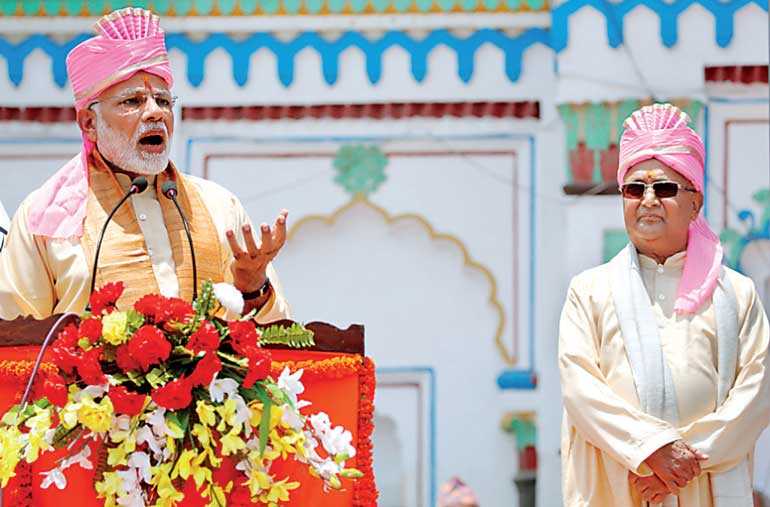Thursday Feb 26, 2026
Thursday Feb 26, 2026
Monday, 14 May 2018 00:00 - - {{hitsCtrl.values.hits}}

India’s Prime Minister Narendra Modi with Nepal’s Prime Minister Khadga Prasad Sharma Oli, also known as K.P. Oli during his visit at Janaki Mandir, a Hindu temple dedicated to goddess Sita, in Janakpur, Nepal - REUTERS
Kathmandu (Reuters): Indian Prime Minister Narendra Modi on Friday (11 May) visited Nepal to launch building work with his counterpart K.P.Sharma Oli on the country’s biggest hydroelectric project, as New Delhi seeks to rebuild trust in the Himalayan republic, where China has made deep inroads.
At a ceremony in Kathmandu, Modi and Oli pushed a button that opened the curtain on a plaque at the site of the 900 MW hydro-power project, formally marking the start of construction work there.
The project, which is expected to cost $1.04 billion and is being built by state-run Indian firm Satluj Jal Vidyut Nigam (SJVN) Limited, will be the single biggest foreign investment project in cash-strapped Nepal.
India has an open border with Nepal and tens of thousands of Nepalis work in India. The two countries share close religious and cultural bonds.
But India has been slow to implement projects despite ambitious plans, and it has also often been a target of Nepali politicians critical of what they see as meddling by their much bigger neighbour.
China, on the other hand, is pouring aid and investment into Nepali hospitals, roads and hydroelectric plants.
“As Nepal enters a new era of consolidating the gains of a democracy and achieving economic growth, India remains a steadfast partner,” Modi said on Twitter before his visit.
Project officials say they are in the final stages of agreement with the State Bank of India for investment of about INR 36 billion ($535 million) for the Arun 3 project, with the rest coming from SJVN.
The project is moving forwards just as a Chinese proposal to build a 750 MW power plant in west Nepal has run into a roadblock. China’s Three Gorges International Corp is haggling for better terms, Nepali officials said.
“The power plant will provide employment, economic and business opportunities to Nepal,” Modi told reporters.
Last year Nepal cancelled the award of a 1,200 MW power project called Budhi Gandaki to a Chinese company.
Ahead of Modi’s visit, Nepal’s Energy Minister Barsha Man Pun on Tuesday announced that the government would invite global bids for building the Budhi Gandaki project.
Modi is visiting for the first time since protests for a greater say in government by ethnic Madhesis, in Nepal’s lowland south, led to the closure of the border for months in 2015 and 2016.
NEW DELHI (Reuters) - Exit polls in the southern Indian state of Karnataka on Saturday suggest Narendra Modi’s BJP could emerge as the leading party, potentially boosting the prime minister’s chances of winning a second term in general elections early next year.
Both Modi and Congress leader Rahul Gandhi, the scion of the Nehru-Gandhi dynasty that has dominated Indian politics since independence, have campaigned hard in Karnataka, a state of 66 million people with diverse constituencies.
While three TV channels predicted 80 to 114 seats for Modi’s Bharatiya Janata Party, short of the half-way mark in the 224-member house, polls also forecast 22-43 seats for a regional group, Janata Dal (S), which could emerge as a kingmaker.
Modi is seeking to wrest control over one of the few places left in the hands of the opposition Congress party and with the help of other small parties, Modi’s party has captured power in some other states such as Goa.
Another poll by India Today TV, released after voting closed on Saturday, predicted 106-118 seats for the Congress party in Karnataka, which is the only place in South India where the BJP has ever managed to win control of the state government.
The Hindu nationalist BJP and its allies hold power in 22 of India’s 29 states, but after Karnataka, three more state elections are due to take place by the end of the year.
Votes will be counted on Monday and exit polls and other surveys have often been wrong in India. Political parties said it was too quick to call the election result.